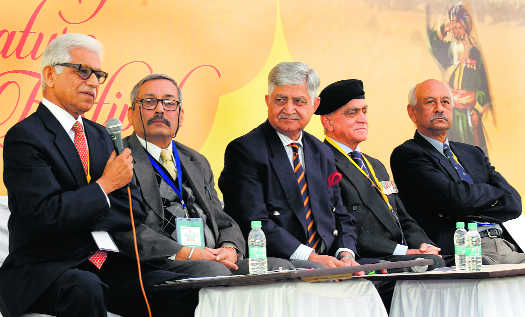
Maj Gen MP Bhagat (retd) speaks as (L-R) Lt Gen HS Lidder (retd), Gen VP Malik (retd), Lt Gen TS Shergill (retd) and Lt Gen SR Ghosh (retd) look on, during the Military Literature Festival at Lake Club in Chandigarh on Saturday. TRIBUNE PHOTO: RAVI KUMAR
Vijay Mohan
Tribune News Service
Chandigarh, December 9
Former Army Chief Gen VP Malik here today said military diplomacy could effectively supplement foreign policy, but India was unable to make full use of this aspect because of the set up of the Central Government where military was not adequately consulted or even recognised as an important element of diplomacy.Maintaining that while military diplomacy could never replace regular diplomacy, Gen Malik said much more could be achieved in the realm of foreign policy with active participation of the military. “Joint exercises, delegation exchanges and high-level visits can lead to better understanding between militaries and can help avoid war or hostile situations. Coercive diplomacy or quiet liaisoning can play a vital role if the military comes into the picture,” he said.Lt Gen SR Ghosh (retd) said joint exercises with friendly countries, part of military diplomacy, was important as these sent a clear message to the target nation. “Because of their high visibility, such operations are critical to power projection,” he said. Lt Gen TS Shergill (retd) said joint drills were a means of learning about the weapon system and tactics of other countries and also offered a useful insight into contemporary military practices and thought. Recalling a visit by then Defence Minister Pranab Mukherjee to Washington where the American protocol was tweaked, Lt Gen Ghosh, then defence attaché, said, “While working out the schedule, the issue of US Secretary of Defence Donald Rumsfeld hosting a dinner for Mukherjee came up and we were told Rumsfeld never ever hosted a dinner for anyone.” On repeated insistence and after being told that the Americans should reciprocate Mukherjee hosting dinner for Rumsfeld in New Delhi, they finally agreed, but the dinner was to be held in a restaurant. As the dinner was progressing, then US Vice President Dick Cheney walked in through backdoor to join in, he added.Lt Gen HS Lidder (retd), who was posted as defence attaché to Washington in the wake of India’s second nuclear tests, recalled how for over a year, there was nothing to do because of the cold shoulder extended by the US. “Then 9/11 happened and we were called in for the first time and told by the Americans that they now understand India’s experiences and the pain it has been enduring. They sought our inputs,” he said. He said India would never be a great power unless it migrated from being a reactive to a proactive nation. And if that has to be done, military diplomacy would have to come of age. Recalling his tenure in Washington from 1992-96 when the Indo-US relations were at its lowest ebb, Lt Gen Shergill said then US Assistant Secretary of State for South Asia was intensely pro-Pakistan.
